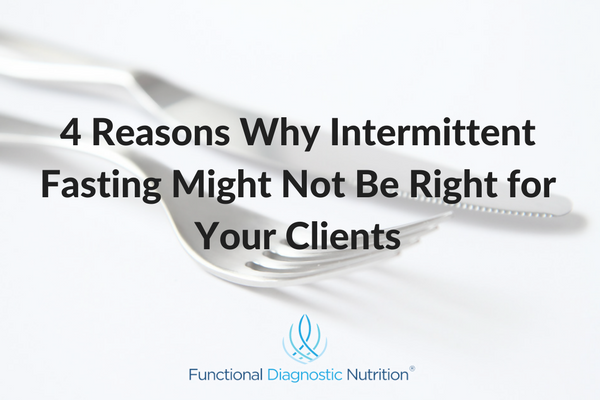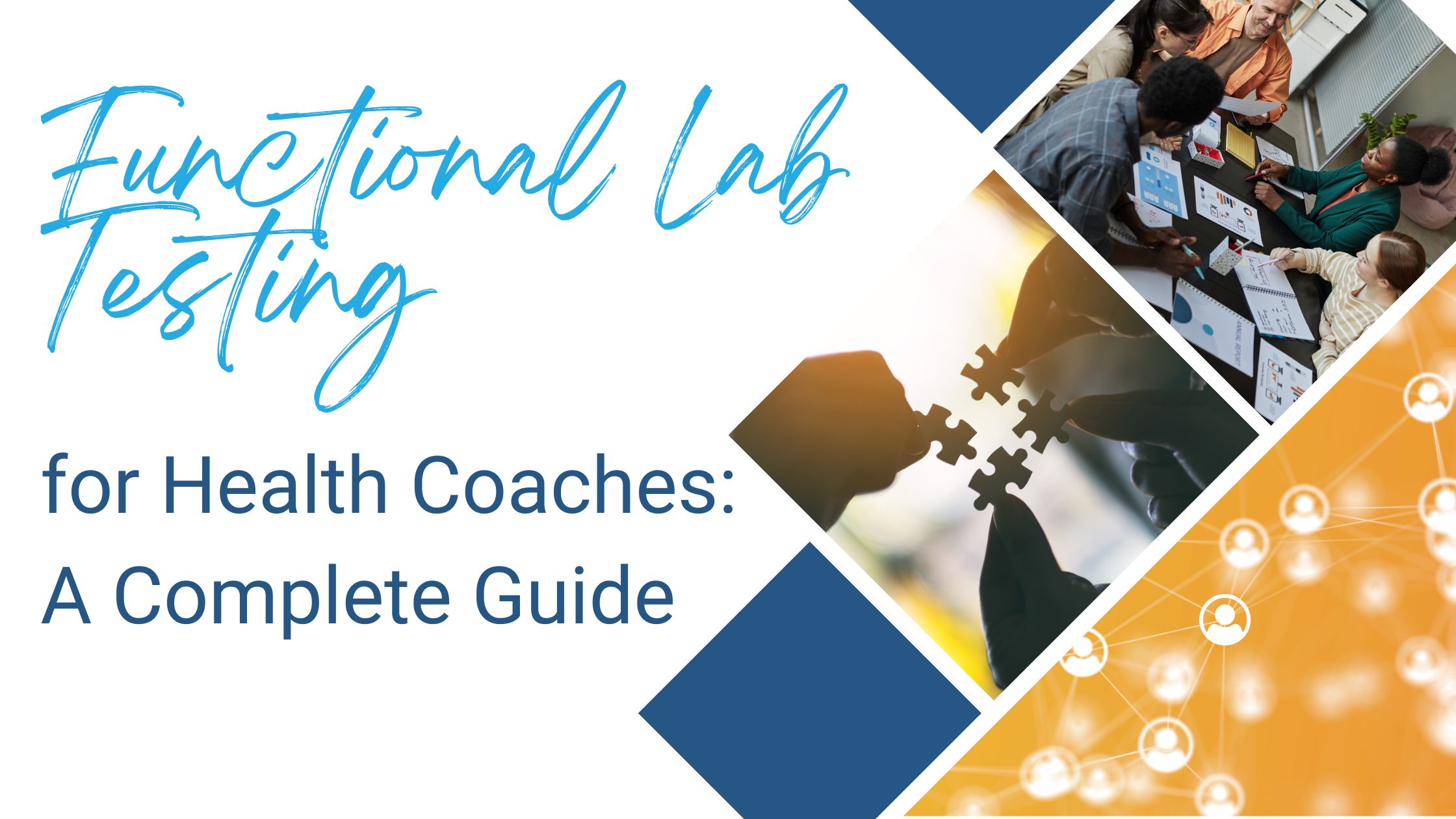Megyn Kelly’s segment (1) on intermittent fasting on January 4th featured Sumaya Kazi’s 50-pound weight loss success (2) and spoke of the amazing health benefits of intermittent fasting.
Before Megyn Kelly, there was Terry Crews, former NFL star, who did a video for Business Insider in which he stated that intermittent fasting keeps him in shape, and there was Dr. Rhonda Patrick. She spoke about intermittent fasting on the Tim Ferris show last May. He said that it was one of the most popular podcasts he’s ever done.
With all this interest in intermittent fasting, functional health coaches will encounter interested clients.
What is a functional health perspective on intermittent fasting?
On the positive side, intermittent fasting is a well-established health practice. We’ve been trained to think that skipping meals suppresses metabolism, causes muscle loss, or blood sugar problems. Jason Fung, M.D., author of The Complete Guide to Fasting: Heal Your Body Through Intermittent, Alternate-Day, and Extended, has demonstrated that these statements are not true.
Regular fasting has been practiced safely since time immemorial. The belief that we need 3-6 meals a day is actually a new, first-world idea, originating in the 60s and 70s, along with mass food production and advertising for prepared food products.(3)
We think of “balanced diet” as a regular intake of balanced meals. The truth is, fasting can bring balance.
The Functional Diagnostic Nutrition® program is about restoring homeostasis.
Fasting is a good insulin regulation, and it is true that insulin sensitivity can be restored with intermittent fasting. Food of any kind raises insulin levels, if even just a little with proteins and fats. When we always eat at regular intervals, without interruption, we create a constant state of elevated insulin. Not eating is a low insulin state. Therefore, pausing food intake brings balance.
When no food has been taken in for about 24 hours glycogen stores in the liver are used up, and the body switches from food burning to fat burning. Since fat storage is meant to supply food in famine, it stands to reason that allowing our bodies some time to switch from food to fat for energy is also a necessary balancing act.
Periods of time where we release our bodies from the heavy burden of digesting food, then, is a good way to balance blood sugar and insulin, and it enables more balanced energy usage as the body is able to use stored fat. Eating and then not eating, as it turns out, is a balanced method of managing these functions.
Does that make it right for everyone, though? FDN practitioners know the answer to that is no. There is no diet or lifestyle that is right for everyone.
How do you tell when someone might not be a good candidate for intermittent fasting? You take them through the regular FDN D.R.E.S.S. for Health Success™ process, and you correlate the program with the bioindividuality of the client.
Intermittent fasting is no different than any other diet or lifestyle change. FDN practitioners trust their training and keep it in proper perspective.
If we just do what we do, and coach our clients through the proven D.R.E.S.S. for Health Success™ program. Clients may find they don’t need intermittent fasting.
The following issues present known problems with intermittent fasting:
- Many women with existing hormone imbalances.
- Those who are in a state of malnutrition from a history of poor eating habits.
- Those with toxic overload might find the detox reactions overwhelming. (Who doesn’t have a congested liver these days?)
- Those with sleep problems.
Women, more than men, can be sensitive to the hormone changes that take place during fasting.
Hormone changes take place because of a woman’s body’s design to protect an unborn child. Women are wired for pregnancy and have a strong hormone reaction to starvation signals, even when not pregnant. One study showed hormone disruption in rats during intermittent fasting (4) that were severe enough to cause fertility issues and ovary shrinkage. Many women are reporting extreme hunger and difficulty getting started on an intermittent fasting regimen because of these hormone issues. (5)
The body produces more leptin and ghrelin in response to starvation signals, which disrupts hormone production and ovulation. The extreme hunger associated with these signals can cause a client to overeat on non-fasting days, which will exacerbate existing imbalances. They can find themselves caught in a frustrating cycle after starting intermittent fasting.
People with a history of poor eating habits should ease into intermittent fasting.
Supporting nutritional deficiencies before embarking on a fasting discipline is important. Malnutrition causes the body to react to intermittent fasting more extremely. Most people eating the typical American diet would fall into this category, and improving cellular health, cellular energy, and improved absorption should be addressed first.
Eating nutrient dense, real food is important for successful fasting and for avoiding the hormone imbalances that can result if the body does not have healthy storage to endure the time off from eating. Starvation signals are more likely to cause strong reactions if the body is already deficient.
Lifestyle changes that include better nutrition takes time and coaching. Our clients should understand their body’s need for nutrition, and not think of fasting as a magic cure.
People with congested livers would have some difficult detox reactions to intermittent fasting.
Liver function would also be supported through better nutrition and cleansing before graduating to a fasting lifestyle. It would result in more stable success because it would be more comfortable for the client.
Many clients present with insomnia.
Poor sleep is often a client’s main complaint, and this can be a problem with intermittent fasting because cortisol and insulin are hormones involved in sleep. They also tend to be thrown off with fasting in people who are not sleeping well.
Metabolic chaos™ presents with fatigue, brain fog, memory problems, digestion, hormone imbalances, malnutrition, weight loss or weight gain, and blood sugar imbalances – things that often don’t warrant conventional medical treatment but are increasingly lowering our quality of life. Fasting too soon could cause these problems to worsen and send the client on a roller coaster of hormone imbalance.
These people need functional coaching in order to bring about the balance that would eventually make for successful fasting.
Our proven program uncovers stressors in the hormone, immune, detoxification, digestion, energy production, and nervous (HIDDEN) systems. We begin by using the BioHealth 205, DUTCH test, BioHealth 101, and other labs, to reveal malfunction in these systems, and we start by coaching the client back into balance through diet and lifestyle changes, along with some supplements. As we walk our clients through this process, balance is resumed, and symptoms begin disappearing. The client is empowered and educated about how to get healthy and stay healthy.
After achieving better balance, the bioindividual needs of the client may point towards intermittent fasting. At that point, trying intermittent fasting will not be a very difficult task, and they will be more successful, anyway.
Want to access lab testing for your clients?
Become a Functional Diagnostic Nutrition® Practitioner and get your hands on our tests to begin helping your clients achieve balance! They might still be interested in intermittent fasting, and if they are, they will be part of the group finding success with it. It won’t be another tried and failed attempt at dieting.
Go to functionaldiagnosticnutrition.com to learn more about our online course.
If you are a patient, looking to learn more about self-care, and would like to work with an FDN practitioner, go to fdnselfcare.com.
Bibliography:
- Kelly, Megyn. “Meet a Woman Who Lost 50 Pounds Through Intermittent Fasting.” Meet a Woman Who Lost 50 Pounds through Intermittent Fasting, The Today Show, 4 Jan. 2018, (1) https://www.today.com/video/meet-a-woman-who-lost-50-pounds-through-intermittent-fasting-1129151555597.
- Kazi, Sumaya. “My Intermittent Fasting Lifestyle: How I Dropped 50 Pounds.” Medium, Personal Growth, 19 July 2016, medium.com/personal-growth/myifguide-38037b3b1ec4.
- Fung, Jason, and Jimmy Moore. The Complete Guide to Fasting: Heal Your Body through Intermittent, Alternate-Day, and Extended Fasting. Victory Belt Publishing, 2016.
- Kumar, Sushil, and Gurcharan Kaur. “Intermittent Fasting Dietary Restriction Regimen Negatively Influences Reproduction in Young Rats: A Study of Hypothalamo-Hypophysial-Gonadal Axis.” PLOS ONE, Public Library of Science, 29 Jan. 2013, journals.plos.org/plosone/article?id=10.1371%2Fjournal.pone.0052416.
- Boldt, Ethan. “Intermittent Fasting … for Women.” Axe, 4 Dec. 2017, draxe.com/intermittent-fasting-women/.







